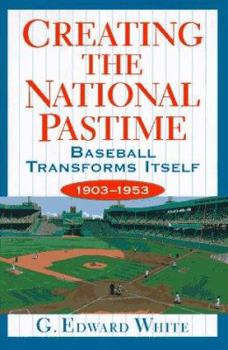Creating the National Pastime: Baseball Transforms Itself, 1903-1953
Select Format
Select Condition 
Book Overview
At a time when many baseball fans wish for the game to return to a purer past, G. Edward White shows how seemingly irrational business decisions, inspired in part by the self-interest of the owners but also by their nostalgia for the game, transformed baseball into the national pastime. Not simply a professional sport, baseball has been treated as a focus of childhood rituals and an emblem of American individuality and fair play throughout much of...
Format:Hardcover
Language:English
ISBN:0691034885
ISBN13:9780691034881
Release Date:March 1996
Publisher:Princeton University Press
Length:364 Pages
Weight:1.64 lbs.
Dimensions:1.1" x 7.8" x 10.0"
Customer Reviews
4 ratings
Money talks and baseball evolves
Published by Thriftbooks.com User , 18 years ago
This interesting though overly academic book explores the evolution of baseball from roughly 1903 to 1953, and like the Darwinian kind it was rather slow and labored. White believes most of the changes in the sport can be traced to newer ballpark designs that developed as the game evolved from a dead-ball game to a home run-hitting game, the formation and popularity of the Negro Leagues, the role of the commissioner, night baseball, the use of radio to bring the game to a wide audience across the land, and expansion. Change was slow and even fought against, though economics always had the final say. Owners couldn't or wouldn't see change as being beneficial: the game was thought to be "frozen in time" and tradition was to be preserved at all cost (mostly). White's theories are fascinating and well developed, though the tone and style of the book are somewhat scholarly, which might leave some casual fans feeling overwhelmed and worn out after reading it. It's a good book, however, and worth the effort.
How did Major League Baseball (MLB) Emerge in the First Decades of the Twentieth Century as the Pree
Published by Thriftbooks.com User , 18 years ago
G. Edward White, a professor of law at the University of Virginia, draws together seven major threads to craft a useful explanation of how, as the subtitle states, "Baseball Transforms Itself, 1903-1953." Basically this is a book of essays, one each on (1) the ballparks; (2) gambling, the "Black Sox" scandal, and the appointment of a commissioner; (3) the Negro Leagues; (4) night baseball; (5) baseball journalism; (6) baseball on the radio; and (7) ethnicity and baseball. These chapters are self-contained and offer interesting perspectives on MLB. Two overview chapters dealing with MLB during the first half of the twentieth century, and a conclusion on the decline of the national pastime, complete the book. White asserts that baseball emerged from lower class roots in the nineteenth century to become the centerpiece of sport by a new leisure class. There are important reasons for this, he believes, and so these essays probe them. As might be expected of a law professor, White finds the strength of MLB's emergence resting on legal frameworks. The game itself was contradictory to industrial America of the early twentieth century and it had to erect legal bulwarks to thrive. The courts allowed these, even encouraged them. The reserve clause, binding a player to a team even if no valid contract had been signed, was clearly a legal structure controlling both players and the market. Franchise rights to territories, radio broadcast conventions, the anti-trust exemption that MLB still enjoys, the prohibition on African American players, owners' abilities to blacklist players and control virtually every other aspect of their business situation, and after 1920 the all-powerful commissioner all served to create a stable business environment that, as long as it remained in place, allowed MLB to thrive. So consumed with the nostalgia that they used to gain these advantages, MLB owners eventually came to believe it themselves and their positions ossified on virtually every issue. They resisted change of any type and successful innovations such as night baseball and broadcast over the radio proved difficult to implement. White is at his best when analyzing race and ethnicity in MLB, and his chapters on the Negro Leagues and on ethnicity, revolving around Hank Greenburg and Joe DiMaggio, is among the best in the book. The decline of MLB in the 1950s and 1960s is poignantly described as the pastoral setting so carefully created by the owners, with lots of help from politicians, writers, and others, came crashing down and the realities of the modern world intruded on the diamond in ways not seen before. "Creating the National Pastime" is an interesting and somewhat idiosyncratic work, but one of great substance and insight.
Baseball history at its best
Published by Thriftbooks.com User , 24 years ago
Expensive yes. But every line is loaded with facts. The detail about Shoeless Joe is better than anywhere. Old time stadiums? No finer discussion. Baseball on the radio? What a great introduction to the subject.This is a commanding book. You will read it if you start.
Good general book for the baseball historian
Published by Thriftbooks.com User , 24 years ago
G. Edward White's book, Creating the National Pastime, examines the changes in major league baseball during the first half of the 1900's. The slow acceptance of radio, night baseball, black players, the rise of the commissioner's office, and the ironclad nature of the reserve clause are among the topics looked at in the book. The book does a good job examining some of the changes that took place between 1903 and 1953 in baseball that we take for granted today (night baseball, steel and concrete ballparks, etc.), but does get tedious at times with its wealth of somewhat arcane information. Overall, a pretty solid (if not always engrossing) read.






